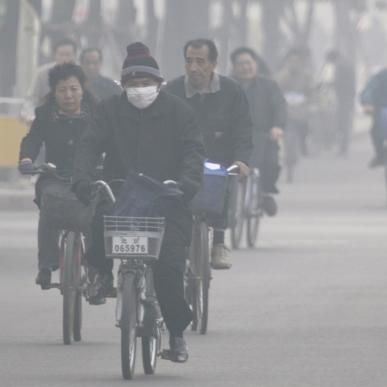By: Liz Delaney, Senior Manager, EDF Climate Corps Operations
China is, in many ways, the epicenter of the world’s efforts to curb climate change. The rapidly growing nation’s need for energy is soaring – demand is expected to double by 2020 – and China has surpassed the United States to become the biggest emitter of greenhouse gases.
So it makes total sense for the Environmental Defense Fund to expand its unique fellowship program, Climate Corps, to China this summer to help leading global brands there find energy efficiency and sustainability solutions that help them thrive. EDF is partnering with Apple, Wal-Mart, McDonald’s, Cummins and Legrand in China, initially placing six graduate students to work with the companies.
Such efforts will also help China and its 1.3 billion people begin to address an air pollution problem that has grounded flights, caused health emergencies, and threatened food supplies in recent months.
Reducing emissions and energy use
Widening the Climate Corps program to China, where EDF has already been working for the past two decades, is a natural and necessary progression for us.
Turns out, several of the large corporations we’re already working with through Climate Corps were also eager to improve efficiency in China – as were 40 of the Chinese-born graduate students who applied to our program this year.
It fits well with EDF’s overall strategy for China, which focuses on the urgent need to cap carbon emissions. Our goal is to shift the country away from its dependency on coal to cleaner energy alternatives and to slow the growth of energy demand — all while leveraging top government priorities to improve air quality and reduce poverty.
EDF Vice President Dan Dudek heads a team of 28 staffers in our Beijing, Shanghai, New York, San Francisco, and Washington offices and serves as a senior advisor on the China Council for International Cooperation on Environment and Development, the highest international advisory body on the environment in the country.
Our recent successes in China include working with the government to lay the foundation for a national carbon market that gives industry economic incentives for cutting emissions. EDF supported the development of the first program in Shenzhen and now conducts training programs for the seven regional pilots under way.
The Shenzhen program alone is expected to reduce carbon emissions per unit of Gross Domestic Product by as much as 21 percent by 2015. According to the World Bank, the seven pilots already cover 250 million people and one-third of the Chinese economy.
Energy savings = good business
With EDF Climate Corps, meanwhile, we have a successful program that can be replicated across industries, geographies and cultures at a time when a growing number of nations focus on energy efficiency as a way to cut costs and pollution.
Buildings account for 27 percent of total energy demand and about 60 percent of carbon emissions in China’s urban areas.
The country’s current five-year plan (2011-15) mandates new green buildings that will help save 9 million tons of coal and avoid 18 million tons of carbon emissions compared to standard buildings. China faces huge challenges as it seeks to improve building energy performance. About one-third of the 40 billion-square meters of existing building space must be retrofitted for energy efficiency.
Since Climate Corps launched in the United States in 2008, our fellows have uncovered opportunities that could avoid 1.3 million metric tons of carbon emissions and cut 2 billion kilowatt hours of electricity every year in the private and public sectors. Climate Corps fellows are building the business case for energy efficiency.
With this summer’s pilot program starting in China, we will lay the groundwork to drive similar success in that nation.
This commentary originally appeared on our EDF Voices blog.










